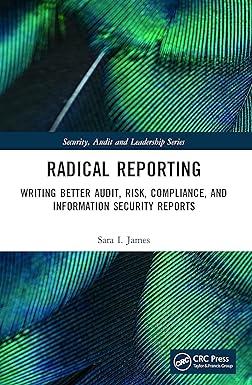Question
(A) Which one of the following statements is true ? a. An accrual basis taxpayer accepts a note receivable from a retail customer with a
(A) Which one of the following statements is true?
a. An accrual basis taxpayer accepts a note receivable from a retail customer with a weak
credit rating. The taxpayer immediately sells the note to a bank for less than the notes
stated value. The taxpayer has a short-term capital loss.
b, A university professor writes a mystery novel and publishes it at his own expense. Several
years later, a national publishing company buys the copyright to the book for $345,000.
The professor has a long-term capital gain.
c. A franchise transfer is generally a sale or exchange of a capital asset.
d. Both C corporations and individuals net together their capital gains and losses.
(B) Which one of the following statements is true?
a. Section 1231 applies to the sale or exchange of business properties but not to any
involuntary conversions.
b. If there is net Section 1231 loss, it is treated as a short-term capital loss.
c, Personal use property casualty gains and losses are not subject to the Section 1231 rules.
d. Section 1231 property includes non-personal use property where casualty losses exceed
casualty gains for the tax year.
Step by Step Solution
There are 3 Steps involved in it
Step: 1

Get Instant Access to Expert-Tailored Solutions
See step-by-step solutions with expert insights and AI powered tools for academic success
Step: 2

Step: 3

Ace Your Homework with AI
Get the answers you need in no time with our AI-driven, step-by-step assistance
Get Started


